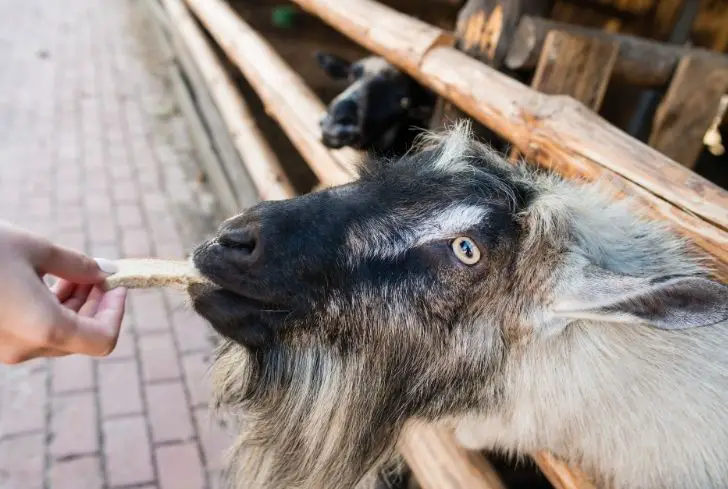There are many misconceptions about goats’ vision. Some people believe that their eye color affects their vision, some believe that goats are colorblind, while others claim that goats cannot see at night.
If you have pet goats, it is very important for you to know facts from myths. Well, that’s exactly what this article is here to help you with. Can goats see in the dark? Yes, goats can see well in the dark and can even identify predators without much light in their surroundings. Keep reading to find out more and have all your other questions answered!
Contents
Do Goats Need Light To See in the Dark?
No, goats don’t need light to see in the dark.
It is common for goats to wander and graze at night in their natural habitat. So, it goes without saying that goats are able to see in the dark without any difficulties. As goats are prey animals, their eyes have adaptations that enable them to spot predators with ease.
In fact, goats’ eyes have many complex features that help them with a variety of tasks. When it comes to being able to see at night, you might be surprised to know that goats are better equipped to see without light than human beings.
Their eyes allow them to see their surroundings (and the possible predators in them) even when it is dark outside. So, you can freely let your goats roam around at night without worrying about them bumping into things or getting lost.
And if anyone tells you that goats cannot see well at night, you might want to clear this misconception for them. But keep in mind that we don’t mean to say that being able to spot predators in the dark is all your goats need to protect themselves. It is always a good idea to fence the area that your goats roam in so that there is no scope for danger.
How Can Goats See in the Dark?
Goats are able to see in the dark because of the shape and design of their pupils.
As we mentioned, goats are prey animals and therefore have certain adaptations to protect themselves. One of these adaptations is horizontal, rectangle-shaped pupils which allow them to let in more light while it is dark outside.
On the other hand, most other animals have round and vertical pupils. This limits the amount of light that enters their retina and restricts their night vision. In the next section, we’ve covered all the unique features that allow goats to see so well.
What is So Special About Goat’s Eyes?
By now, you might not be surprised to know that goats have special adaptations in their eyes. These help them spot predators with ease, control the amount of light that enters their retina, filter unnecessary details out of their environment, and much more.
Firstly, goats have rectangular-shaped pupils that are horizontal rather than vertical. This allows goats to see a range of almost 360 degrees of their environment. Moreover, the shape of their pupils also allows goats to control how much light that enters their eyes.
This has more benefits than you would imagine. Goats are able to see with ease despite it being dark in their surroundings as more light is allowed to enter their pupils.
This means that goats have better night vision than humans and protects them from falling into the hands of any predators. Additionally, during the day, goats can restrict the amount of sunlight that enters their eyes to help them see more clearly.
Without excessive light entering their eyes, goats are able to spot predators in their surroundings more clearly. Moreover, as they have a large range of vision, goats are able to escape from predators by being able to see or avoid any obstacles around them.
The next unique feature about goats is that they can rotate their pupils very far. Goats can clearly see their surroundings even when their heads are bowed down as they can raise their pupils parallel to the ground.
This allows goats to spot any predators even while they are grazing and looking towards the ground. Since they have a very large field of vision, goats have a mechanism to filter out unrequired details from their surroundings to focus solely on any potential danger.
So, as you can tell by now, goats have extremely efficient adaptations that help them remain safe. They can see clearly in the dark, have a large range of vision, and focus on only the parts of their surroundings that are important.
Can Goats See Colors?
Yes, goats can see colors.
After knowing all the impressive features that enable goats to have a heightened sense of vision, you might be wondering whether they can see color or not.
You might assume that these features allow goats to have a better vision than humans, but this is not the case when it comes to identifying different types of colors around them.
There is a common misconception that goats are colorblind but if you have a pet goat, it is important to know that this is not true. In fact, their ability to see a range of colors aids goats while spotting predators and keeping themselves safe.
What Colors Can Goats See?
Needless to say, goats cannot differentiate between colors as well as human beings can. Human beings have three types of cone cells whereas goats only have two types. Cone cells are receptors of color located in the retina.
The cone cells of human beings can be sensitive to the colors blue, green, and red. However, the two types of cone cells that goats have only allow them to see the green and blue colors in their environment.
A recent study found that goats can detect the color orange most easily whereas, on the opposite side of the spectrum, goats have difficulty seeing the color blue distinctly. So, any colors that goats cannot perceive well appear to have a yellowish hue to their eyes.
Can Pygmy Goats See Color?
Yes, Pygmy goats are able to see color like any other type of goat.
Pygmy goats are a breed of draft goats that are mainly found in North America. They have a smaller and chunkier build than other breeds of goats. Although they are mainly found in zoos, Pygmy goats have now begun to be domesticated as well.
Regardless of their differences with other breeds, Pygmy goats have the same adaptive features as they are also prey animals. One of these defense mechanisms is being able to perceive and differentiate between a range of colors.
Pygmy goats can see many colors including orange, blue, red, yellow, violet, and green. Being able to differentiate between these colors allows Pygmy goats to identify any potential predators and dangers in their view.
Moreover, being able to see color also enhances the night vision of both Pygmy goats and other breeds. However, you must remember that even Pygmy goats have fewer cone cells than human beings. So, they are able to see a limited range of colors than us.
What Do Goats Do at Night?
We’re sure you already know that goats have a sleep pattern different from human beings. There are many misconceptions about the sleeping patterns of goats – ranging from the myth that goats sleep with their eyes open to that goats don’t sleep at all.
You might have also heard people say that it is impossible to find goats sleeping. The truth is that goats need much less sleep than other animals. Goats sleep for around six hours each day and tend to sleep in short bursts rather than at once like human beings.
Additionally, as they are prey animals, goats are light sleepers. Any type of disturbance or indication of possible danger and predators can break their sleep. So, it shouldn’t be unusual to see that your goats are awake at most times, including at night.
Since they have a drastically different wake and rest period, your goat might end up feeling hungry at night. So, goats often try to roam around and look for food at night.
If you have left your goats in an open or unprotected area overnight, there might be a risk of them wandering away or encountering a predator. So, it is important to make sure that you keep your goat in a fenced and sheltered area overnight.
Are Baby Goats Scared of the Dark?
No, baby goats are not scared of the dark.
Now that you know goats are able to see very well at night, this should not be a surprise to you. However, you might have heard people claim or have seen your own baby goats being hesitant to go out in the dark.
The reason for baby goats being scared of going out at night is not what you might have assumed. Domesticated baby goats are usually exposed to artificial lights and the instant change from brightness to the dark can be intimidating for them.
So, how can you ease your baby goats into being comfortable with the dark? We do not recommend cutting off all sources of artificial lights all of a sudden. A gradual decrease of artificial lighting over a span of a week or so should be able to ease your baby goats.
Final Thoughts
There are many misconceptions when it comes to taking care of goats. We hope that after reading this article, many of these myths were busted for you. You now know that goats are able to see in the dark and that they are not colorblind.
Additionally, goats have many adaptations that give them an improved vision and protection for possible predators. So, you can now take care of your goats to the fullest without falling for any false information!







